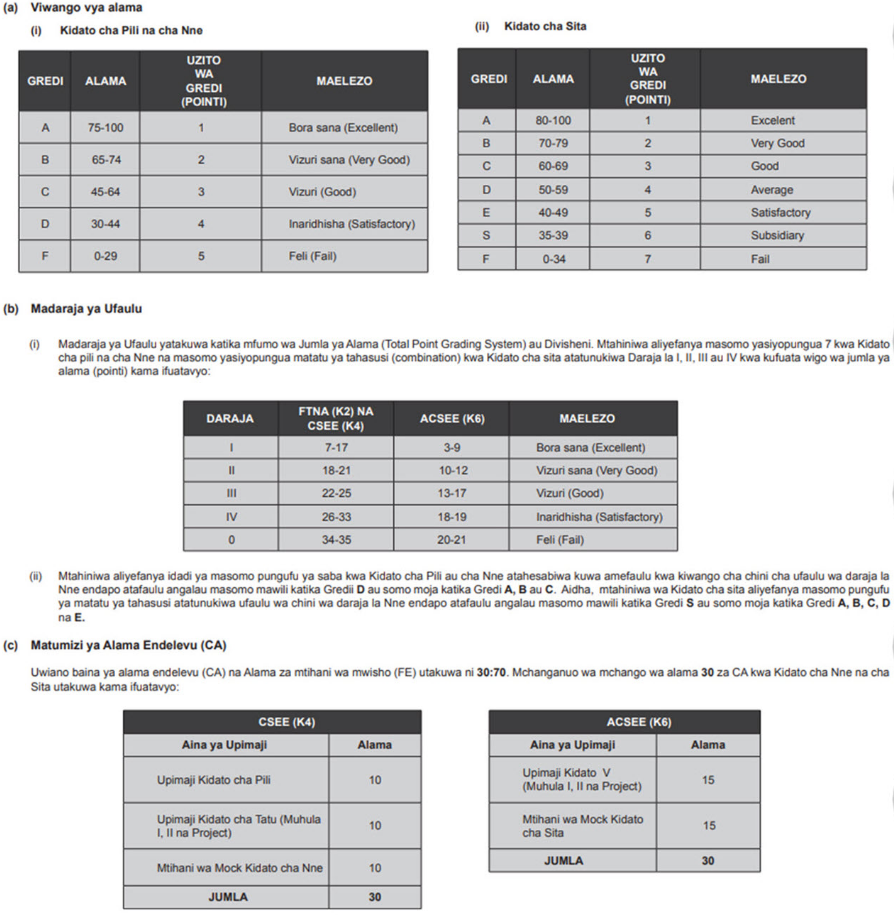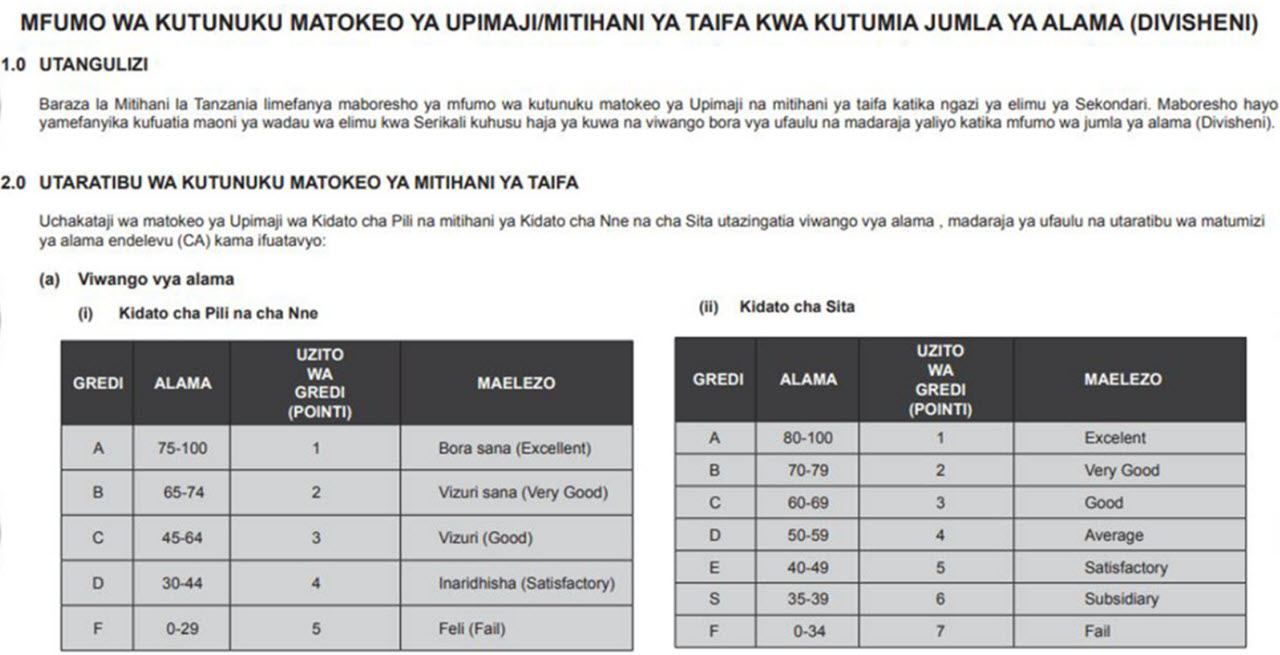Necta Grading System 2024
Understanding Necta Form Four Exam Grading System 2024 – The Necta Form Four results are highly anticipated in Tanzania as they play a crucial role in shaping the future academic and career trajectories of students. These results determine eligibility for continued education and job opportunities, so it is essential that students and parents understand passing scores.
The Necta Form Four exam has different qualifications and corresponding scores, each with its importance for future academic and career prospects. Understanding Necta Form Four Exam Grading System 2024/Understanding these qualifications is important for students and parents to make informed decisions about their educational and career paths.
The passing grades for the Necta Form Four exams/Understanding Necta Form Four Exam Grading System 2024 are as follows:
1. Division I: This is the highest grade, with a score range of 75-100%. Achieving this qualification opens up numerous higher education opportunities and prestigious job opportunities.
2. Division II: Students with scores between 60 and 74% fall into this category. While it may not be as high as Division I, Division II still offers good prospects for higher education and professional development.
3. Division III: This score ranges between 50 and 59%, indicating satisfactory performance. It allows students to continue their education and some job opportunities.
4. Division IV: Students with scores between 40 and 49% fall into this category. While it is considered a pass, it can limit higher education options and job opportunities.
5. Division 0: This is a failing grade, with a score range of 0-39%. Students who receive this score may be required to retake the exam or explore alternative educational paths.

Understanding Necta Form Four Exam Grading System 2024
It is important for students and parents to understand the implications of these grades on future academic and professional endeavors. By understanding the importance of Necta Form Four results, students and parents can make informed decisions about the next steps in their educational and career journey.
Necta Form Four passing scores are a significant indicator of a student’s academic performance, as well as their potential and readiness for higher education and the job market. These scores not only reflect a student’s ability to perform well on exams, but also their overall readiness for future endeavors in Understanding Necta Form Four Exam Grading System 2024.
Understanding the importance of these results is crucial for both students and parents. In Understanding Necta Form Four Exam Grading System 2024, These scores can be used as a tool to plan for the student’s future, whether it involves continuing their education or entering the workforce.
They provide valuable information about a student’s strengths and areas of improvement, which can guide decision-making regarding career paths and educational opportunities. Therefore in Understanding Necta Form Four Exam Grading System 2024, it is essential that students and parents recognize the importance of these scores and use them effectively in planning the student’s future endeavors.
Necta Form Four Exam Grading System
The NECTA (National Examinations Council of Tanzania) marking system for Form Four examinations takes into account several factors such as overall score, subject scores and continuous assessment (CA) scores. To be eligible to qualify, students must complete at least seven subjects on Understanding Necta Form Four Exam Grading System 2024.
The rating system is divided into five divisions:
1. Division I: This division is awarded to students who obtain an average of 75 to 100 points. It means excellent performance.
2. Division II: Students who achieve an average score of 65 to 74 points fall into this division, indicating very good performance.
3. Division III: This division is for students with an average score of 45 to 64 points, which means good performance.
4. Division IV: Students who obtain an average of 30 to 44 points are placed in this division, indicating satisfactory performance.
5. Division Zero: Students who obtain an average of 0 to 29 points fall into this division, which means they failed.
These divisions provide a clear indication of student performance levels in the Form Four exams administered by NECTA.
How to Preparing for NECTA Form Four Exams
The text provides valuable advice for students preparing for Necta Form Four exams or Understanding Necta Form Four Exam Grading System 2024, as well as the important role parents play in supporting their children’s academic achievement.
For students, preparation tips include:
1. Periodically review class notes to reinforce learning.
2. Complete assignments on time to keep up with the curriculum.
3. Request help from teachers or tutors when necessary to clarify doubts.
4. Practice past exams to familiarize yourself with the format and question types.
Additionally, students are encouraged to focus on their physical and mental well-being by:
1. Get enough sleep to ensure you are well rested to study and take exams.
2. Eat a balanced diet to maintain energy levels and overall health.
3. Engage in regular exercise or stress-reducing activities to manage exam-related stress.
Regarding the role of parents in supporting academic achievement, they are encouraged to:
1. Create a supportive home environment that encourages learning and provides necessary resources, such as textbooks and study materials.
2. Help your children stay organized and manage their time effectively, especially during the busy exam period.
3. Provide emotional support and encouragement by celebrating your children’s achievements and offering words of encouragement during difficult times.
4. Work with your children and their teachers to ensure they are well prepared for the Necta Form Four exams.
Overall on Understanding Necta Form Four Exam Grading System 2024, the text emphasizes the importance of both academic preparation and the overall well-being of students, as well as the vital role parents play in providing support and encouragement for their children’s academic success.
See also:









Leave a Reply